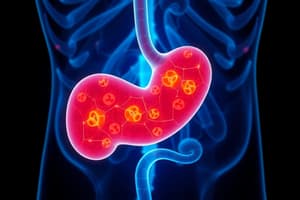Podcast
Questions and Answers
What is a common cause of chronic pancreatitis?
What is a common cause of chronic pancreatitis?
- Alcohol consumption
- High triglyceride levels in the blood (correct)
- High calcium levels in the blood
- Specific genetic mutations
Which symptom is not typically associated with pancreatitis?
Which symptom is not typically associated with pancreatitis?
- Nausea
- Fatty stools
- Fever
- Sudden pain in the lower back (correct)
How is pancreatitis usually diagnosed?
How is pancreatitis usually diagnosed?
- X-ray imaging of the pancreas
- Checking for high potassium levels
- Measuring cortisol levels
- Elevated serum lipase level (correct)
What is a potential treatment for severe pancreatitis cases?
What is a potential treatment for severe pancreatitis cases?
Which complication may arise from chronic pancreatitis?
Which complication may arise from chronic pancreatitis?
What is a lifestyle modification that may be part of the treatment plan for pancreatitis?
What is a lifestyle modification that may be part of the treatment plan for pancreatitis?
What can happen if pancreatitis is left untreated?
What can happen if pancreatitis is left untreated?
Which complication of pancreatitis involves rupture and can cause bleeding and infection?
Which complication of pancreatitis involves rupture and can cause bleeding and infection?
What is the primary function of the pancreas?
What is the primary function of the pancreas?
Which of the following is NOT a common complication of pancreatitis?
Which of the following is NOT a common complication of pancreatitis?
In pancreatitis, what can disrupt the production of essential compounds?
In pancreatitis, what can disrupt the production of essential compounds?
What is a potential consequence of buildup of fluid around the lungs in pancreatitis?
What is a potential consequence of buildup of fluid around the lungs in pancreatitis?
Study Notes
Pancreatitis: Understanding the Disease's Complications, Causes, Symptoms, Diagnosis, and Treatment
Introduction to Pancreatitis
Pancreatitis is a condition characterized by the inflammation of the pancreas. The pancreas is a long, flat gland located behind the stomach in the upper abdomen. Its primary function is to produce digestive enzymes that aid in breaking down food in the small intestine and hormones that regulate blood sugar levels. When the pancreas becomes inflamed, it can disrupt the production of these essential compounds, leading to various complications.
Complications of Pancreatitis
Complications of pancreatitis can range from mild to severe and potentially life-threatening if left untreated. Common complications include:
- Obstruction of a bile or pancreatic duct
- Leakage from a pancreatic duct
- Formation of pseudocysts, which can rupture, causing bleeding and infection
- Damage to the pancreas itself
- Buildup of fluid around the lungs
- Blockage in a vessel that drains blood from the spleen
- Sepsis
- Hypovolemic shock
- Heart, lung, and kidney failure
Without timely intervention, these complications can lead to death.
Causes of Pancreatitis
There are several known causes of both acute and chronic pancreatitis, including:
- Alcohol consumption
- Gallstones
- Certain medications
- Some autoimmune conditions like lupus and Sjögren’s disease
- Specific genetic mutations
- Trauma or injury to the pancreas
- High triglyceride levels in the blood
- High calcium levels in the blood
In about 40 percent of fatal acute pancreatitis cases, the cause remains unknown.
Symptoms of Pancreatitis
Symptoms of pancreatitis vary depending on the severity of the inflammation. Common symptoms include:
- Sudden pain in the upper abdomen
- Nausea
- Swelling in the abdomen
- Loss of appetite
- Fever
- Rapid heartbeat
- Fatty stools
- Diarrhea
- Weight loss
- Jaundice
Chronic pancreatitis may also cause:
- Persistent pain in the upper abdomen
- Malnutrition due to difficulty absorbing nutrients
- Diabetes mellitus due to decreased insulin production
It's essential to seek medical advice if you experience any of these symptoms, as early detection and treatment can significantly improve outcomes.
Diagnosing Pancreatitis
To diagnose pancreatitis, doctors typically look for two of the following criteria:
- Belt-like abdominal pain
- An elevated serum lipase level three times above the normal threshold
- Radiological imaging signs of pancreatitis
Additional tests may be needed to determine the cause and potential complications, such as ultrasound scans, contrast-enhanced CT scans, or blood tests measuring serum triglycerides and full blood count.
Treatment of Pancreatitis
Treatment for pancreatitis depends on the severity and underlying cause. For mild cases, the goal is to maintain bodily functions and ease symptoms while allowing the pancreas to heal. This may involve painkillers, nasogastric tubes, bowel rest, and IV fluid hydration. In severe cases or those with complications, interventions such as cholecystectomy (removal of the gallbladder), endoscopic sphincterotomy, or surgery to drain necrotic tissue may be necessary. Prevention of future attacks through lifestyle modifications, medications, and regular monitoring may also be part of the treatment plan.
Studying That Suits You
Use AI to generate personalized quizzes and flashcards to suit your learning preferences.
Description
Test your knowledge about pancreatitis, a condition characterized by pancreatic inflammation. Explore the complications, causes, symptoms, diagnosis, and treatment options associated with pancreatitis in this informative quiz.




